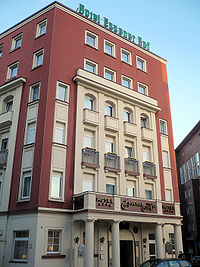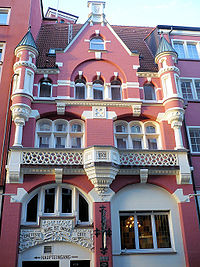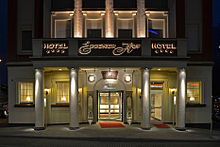Essen court
Essener Hof has been the name of the oldest still existing hotel in the city of Essen since 1975 , which until then was first called Herberge zur Heimat and then Hotel Vereinshaus . Until the mid-1970s, the now demolished Krupp private hotel on Limbecker Platz in Essen bore this name.
Today's Hotel Essener Hof
location
The house is located in downtown Essen , north of the main train station and the House of Technology . Hotel Handelshof is located west of the Essener Hof .
history
Foundation establishment
On September 27, 1883, the parishioners of the Protestant parish in Essen were called upon by Pastor Lenssen to found a hostel. Then on 10/11. November of the year the foundation was established on the occasion of the celebrations for Martin Luther's 400th birthday. With the help of donations, 31,000 marks were collected. On May 13, 1884, it was decided to buy two gardens from Edmund Lührmann, who later founded the Edmund Lührmann Foundation for people suffering from nerves in Essen. Another piece of land measuring 123 square meters was bought by Max Huyssen's heirs for 14,844 marks. The building decision was not made until February 15, 1887, and the building's foundation stone was laid on June 7, 1887. After an architecture competition, the order was placed with the Essen architects Julius Flügge and Carl Nordmann .
Origin of the building
As early as autumn 1887, a meeting of Protestant parishioners took place in the recently completed assembly hall, which later had to make way for an extension. A year later, on 10/11. November 1888, the house with the name Gasthaus und Herberge zur Heimat was opened with a speech by Mayor Erich Zweigert . But as early as July 1889, consideration was given to selling the building, as it was classified as unprofitable. It was considered to give it to the Protestant parish as a community center. This was followed by the establishment of a guarantee fund on October 31, 1889, and a new head of the house was hired, who, however, resigned a year later. August Bosse was employed for this on October 13, 1891, and his descendants are still running the business today. At that time, apart from a few salons with double beds and washing facilities, the house had shared dormitories and shared bathrooms in the corridors. Pastor Klingmann took over the chairmanship of the foundation this year, as his predecessor, Superintendent Lenssen, had passed away. In 1893, the adjacent property on Teichstrasse was bought for 12,075.95 marks, which was made possible by business that was now better. Five years later, work began on the extension and renovation of the existing house, which cost a total of around one million marks. Finally, on January 11, 1904, the hotel clubhouse was inaugurated . In 1912 the chairmanship of the foundation changed again and Heinrich Johannsen took over. In the same year the front building was demolished and rebuilt. There was an estimate for this, which, including the property, had a market value of 1.5 million marks. On October 1, 1921, Alfred Bosse became the new managing director.
Confiscation in the Ruhr War
After the loss of the First World War , the Versailles Peace Treaty in 1919 obliged the Weimar Republic to pay reparations. In 1922, due to economic problems, these had to be converted to benefits in kind such as coal and steel. But in January 1923 these services fell behind, which is why 60,000 French and Belgian soldiers marched into the Ruhr area. The hotel club house was occupied by the French on January 11, 1923 during the so-called Ruhrkampf , and on August 22nd, except for the hostel, it was completely confiscated. They used the lobby as a horse stable. The occupiers released the hotel on September 1, 1924. After repairing damage to the amount of 180,000 Reichsmarks caused by the occupation , the hotel reopened on January 3, 1925.
The club house now housed the Essen General Association of Protestant Churches. On October 1, 1928, two new floors of the hotel with twenty additional rooms were opened. This happened at the urging of the city administration. The clubhouse rooms opened on December 17, 1932. Two years later, Otto Schmemann became the new chairman of the supervisory board. On January 2, 1937, the chairmanship changed again, this time to the privy councilor Dr. Cuntz.
The hostel closed in 1935
The hostel, which served many wandering craftsmen from the beginning, had to be closed on October 1, 1935 for financial reasons, with parts of it being attached to the hotel. In the wing of the building on Teichstrasse, among other things, the Reich Mothers Service set up shop.
Second World War and the aftermath
About three quarters of the hotel clubhouse was destroyed by heavy air strikes and arson. The great hall burned down in 1944. The Wehrmacht confiscated the building. After the end of the war, the Red Cross set up a care center for returning prisoners of war on the ground floor. The hotel was provisionally repaired piece by piece and returned to operation. In 1946 the guests were able to have running water again. Only in 1948, due to the currency reform and the subsequent economic upswing, did the reconstruction progress faster, so that on August 1, 1952 the new restaurant could also be opened.
The way to the Essener Hof
Friedhelm Bosse became the new managing director on January 15, 1955. On April 18, 1958, the Astra-Filmtheater moved into the former large hall on Teichstrasse and started operations here. At the beginning of the 1960s, all church institutions moved out of the house. Under the direction of the architect Hans Engels , the hotel was expanded to 130 comfortable rooms in 1964. The hotel lobby was also modernized and the facade redesigned. In 1968 the restaurant was converted into a farmhouse parlor and a parlor .
In 1975 the hotel clubhouse got its current name: Essener Hof . This name became free again at that time after the Krupp private hotel of the same name on Limbecker Platz had been demolished. To commemorate the founding time of the hostel, a house bar was set up in 1982, which was called the old hostel from 1883 . A complete renovation of the hotel wing began in 1985 and was not completed until ten years later.
The hotel today
The full name of the 4-star hotel is now TOP City & Country Line Hotel Essener Hof and is still in the hands of its foundation, with 55 employees.
The 123 hotel rooms include four so-called long-term apartments. The hotel is air-conditioned and provides wireless Internet access. Since 1996, the company has offered five banquet halls for up to 100 people, the Treff Langeoog restaurant and the Moonlight Express minibar . In 1992, a breakfast room was set up on the courtyard, which was newly laid out as a garden.
Kruppsche's private hotel Essener Hof

Until the mid-1970s, the Kruppsche private hotel opened in 1898 on the Limbecker Straße, today Limbecker Platz , was the bearer of the name Essener Hof . The builder was Friedrich Alfred Krupp . It was created under economic aspects, because the large Krupp cast steel factory in Essen was adjacent to the west . The architect Robert Schmohl , head of the Krupp construction office, designed the hotel especially for industrialists and had it built between 1896 and 1898. Nevertheless, it was open to the public without restrictions with its around 40 rooms, lounge and dining room. As early as 1890, Krupp announced the construction of a clubhouse for the gymnastics and fencing club ETuF Essen , which had been founded six years earlier, in the Essen court. The building was demolished in the mid-1970s.
Web links
Individual evidence
- ↑ a b c WAZ media group article from November 7, 2008: Where Martin Luther looks at the guests ; accessed on May 17, 2016
- ↑ Allgemeine Hotel- und Gastronomie-Zeitung, 2008/46 edition
- ^ Maria Wenzel: Palace Hotels in Germany. Investigations into a building project in the 19th and early 20th centuries. Georg Olms Verlag, 1991, ISBN 3-48709534-3 , p. 182f.
Coordinates: 51 ° 27 ′ 10.1 ″ N , 7 ° 0 ′ 51.5 ″ E






